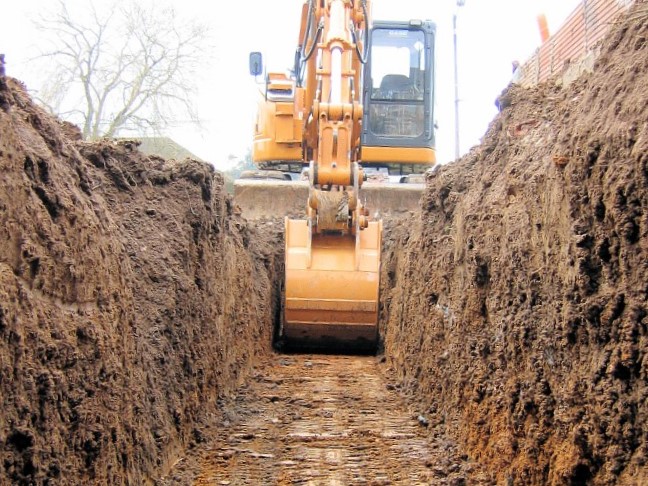Ideal Dump Truck Companies in Ohio - Top-Rated Dump Truck Providers
Ideal Dump Truck Companies in Ohio - Top-Rated Dump Truck Providers
Blog Article
Comprehensive Excavation Methods: Mastering the Principles for Success
The cautious planning, precise execution, and meticulous attention to detail needed in excavation tasks demand a detailed technique that incorporates various essential elements. The true mastery exists not merely in understanding these fundamentals but in effortlessly incorporating them to browse the complexities of excavation tasks with finesse.
Understanding Excavation Project Planning

The initial phase of any kind of excavation job is the preparation stage, where essential choices are made that can substantially affect the result of the project. Understanding the project extent, budget, and timeline restraints is crucial for developing a comprehensive excavation plan that ensures the project's success.
One key element of excavation project planning is the advancement of an in-depth timeline that details the sequence of landmarks, tasks, and due dates. This timeline functions as a roadmap for the job group, permitting them to track progress and make required adjustments to guarantee the job stays on timetable. In addition, a distinct budget that makes up all costs, including tools service, labor prices, and products, is necessary for preventing cost overruns and hold-ups. By carefully taking into consideration all these elements throughout the drawing board, excavation projects can be carried out successfully and properly, causing effective results.
Soil Evaluation and Site Assessment
Carrying out thorough dirt analysis and website assessment is an important action in the preparation phase of any kind of excavation job. Dirt analysis includes establishing the make-up, framework, and buildings of the soil at the excavation website. This info is essential for understanding the dirt's bearing ability, wetness web content, and potential for disintegration, which are crucial elements in determining the excavation approaches and devices required for the task.
Site examination goes past soil analysis and encompasses a more comprehensive analysis of the total website conditions. This analysis includes identifying any possible dangers, such as underground utilities, environmental problems, or unpredictable surface, that might impact the excavation process. By thoroughly examining the site, task supervisors can develop effective excavation approaches that focus on safety and security, effectiveness, and environmental management.
Making use of innovative modern technologies like ground-penetrating radar, dirt sampling, and drone studies can enhance the accuracy and efficiency of soil analysis and site assessment. Spending time and resources in these initial steps can inevitably save time and stop costly delays or complications throughout the excavation process.
Tools Selection and Utilization
Effective excavation tasks rely greatly on critical equipment selection and utilization to make sure optimum performance and productivity. Selecting the right devices for the work is important in taking full advantage of performance and minimizing downtime. Factors such as the kind of soil, depth of excavation, and task range play a considerable duty in establishing the most ideal tools for the job handy.

In addition to picking the proper tools, correct utilization is key to task success. Operators needs to be trained to handle the tools safely and effectively - excavating ohio. Regular maintenance checks and prompt repair work assist prevent malfunctions and make sure constant efficiency throughout the project
Precaution and Laws Compliance
In the world of excavation projects, prioritizing security steps and conformity with guidelines is paramount to guaranteeing a legitimately sound and secure operational environment. Safety procedures incorporate a series of methods, including conducting detailed site assessments, carrying out proper signage and barriers, and giving ample safety and security training for all workers entailed in the excavation process. Adherence to policies, such as OSHA requirements in the United States, makes sure that the excavation job meets the necessary requirements to shield workers, onlookers, and the surrounding setting.

Surveillance Progression and Adjusting Approaches
Exactly how can project managers efficiently track the improvement of excavation jobs and adapt their strategies accordingly to optimize end results? Surveillance development is necessary read what he said for making certain that excavation tasks remain on track and satisfy due dates.

Verdict
Finally, understanding the principles of extensive excavation strategies is important for the success of any task. By comprehending project planning, analyzing dirt and website conditions, picking proper tools, conforming with safety policies, and monitoring progress, task managers can guarantee a smooth and efficient excavation procedure. Executing these techniques will certainly cause successful outcomes and minimize possible threats or troubles throughout the excavation project.
The initial stage of any excavation task is the preparation phase, where vital decisions are made that can significantly affect the outcome of the job. Understanding the job budget, scope, and timeline constraints is important for creating a comprehensive excavation plan that makes sure the job's success.
Exactly how can project managers efficiently track the advancement of excavation tasks and adjust their approaches appropriately to enhance end results? By carefully keeping an eye on progression and being prepared to adjust techniques, job managers can boost the overall success of excavation tasks.
By discover this understanding task preparation, evaluating dirt and website conditions, choosing ideal equipment, complying with safety and security guidelines, and keeping an eye on progress, project managers can ensure a efficient and smooth excavation procedure.
Report this page